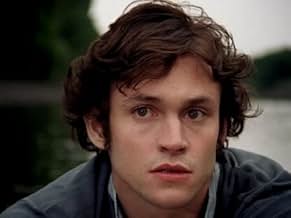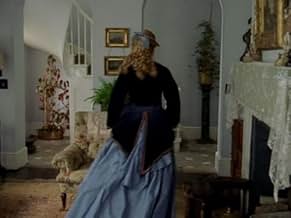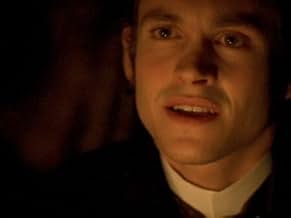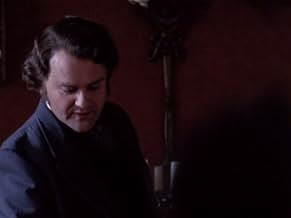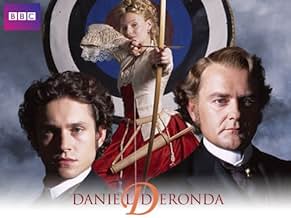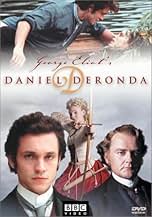Daniel Deronda
- Mini serie TV
- 2002
- 53min
VALUTAZIONE IMDb
7,2/10
5402
LA TUA VALUTAZIONE
Nella Londra vittoriana, Gwendolen Harleth è attratta da Daniel Deronda, gentiluomo altruista e intelligente di origini sconosciute, ma il suo disperato bisogno di sicurezza finanziaria potr... Leggi tuttoNella Londra vittoriana, Gwendolen Harleth è attratta da Daniel Deronda, gentiluomo altruista e intelligente di origini sconosciute, ma il suo disperato bisogno di sicurezza finanziaria potrebbe distruggere le sue possibilità di felicità.Nella Londra vittoriana, Gwendolen Harleth è attratta da Daniel Deronda, gentiluomo altruista e intelligente di origini sconosciute, ma il suo disperato bisogno di sicurezza finanziaria potrebbe distruggere le sue possibilità di felicità.
- Ha vinto 3 BAFTA Award
- 5 vittorie e 4 candidature totali
Sfoglia gli episodi
Recensioni in evidenza
This was one of the more exquisite costume drama adaptations I have seen, with attention to detail absolutely striking in an archery scene that sets the bar for the entire series. Like the novel, it is polarizing in its two stories in one - people seem to either love/hate Daniel's plight or love/hate Gwendolyn's.
Personally, I found Gwendolyn equally annoying in both novel and film. Hugh Darcy, as the eponymous hero, was pretty to look at and delivers a fine, if unremarkable, performance.
But it is Hugh Bonneville as the dastardly Henleigh Grandcourt who took my breath away! He is flawlessly reprehensible, stealing every scene he was in and when he wasn't in a scene, I couldn't wait to see him again! It was terrific seeing Hugh Bonneville in such a role, as he's usually cast in the "very nice guy" roles (Bridget Jones Diary, Iris, Tipping the Velvet, etc). Although he's fine in such roles, as Grandcourt he made my skin crawl with his morally bankrupt, wealthy and pugnacious swagger. LOVED him!
What this series could have used more of was Jodhi May and Greta Scacchi. In difficult supporting roles, both women shine as, respectively, a searching, haunted Jewess and a scorned, bitter mistress. Barbara Hershey makes an appearance late in the series in a pivotal plot device that I won't reveal lest some unsuspecting viewer be bitter with me, and in a limited role gives a performance that reminds us why she became famous in the first place (and at least for this viewer, made me forgive her 'Beaches').
Overall, this adaptation is very enjoyable and recommended viewing for fans of the genre.
Personally, I found Gwendolyn equally annoying in both novel and film. Hugh Darcy, as the eponymous hero, was pretty to look at and delivers a fine, if unremarkable, performance.
But it is Hugh Bonneville as the dastardly Henleigh Grandcourt who took my breath away! He is flawlessly reprehensible, stealing every scene he was in and when he wasn't in a scene, I couldn't wait to see him again! It was terrific seeing Hugh Bonneville in such a role, as he's usually cast in the "very nice guy" roles (Bridget Jones Diary, Iris, Tipping the Velvet, etc). Although he's fine in such roles, as Grandcourt he made my skin crawl with his morally bankrupt, wealthy and pugnacious swagger. LOVED him!
What this series could have used more of was Jodhi May and Greta Scacchi. In difficult supporting roles, both women shine as, respectively, a searching, haunted Jewess and a scorned, bitter mistress. Barbara Hershey makes an appearance late in the series in a pivotal plot device that I won't reveal lest some unsuspecting viewer be bitter with me, and in a limited role gives a performance that reminds us why she became famous in the first place (and at least for this viewer, made me forgive her 'Beaches').
Overall, this adaptation is very enjoyable and recommended viewing for fans of the genre.
Having never read George Eliot's novel, I came into the film with only what I know based on the information friends have given me. The film is utterly exquisite. The costuming alone will have Anglophiles like myself crying from sheer envy, and there's enough archery, riding, and balls to weigh out the seriousness of the film, which is essentially two plots woven into one. An utterly heartless and wretched marriage for a spoiled young Gwendolyn in the form of the evil Grandcourt, a landowner whose sole pleasure lies in torment. Be it his wife or dogs, our heartless villain never takes greater pleasure than in dangling something before them and tearing it away again, only to feed it to someone else. We see a kind of barbarism in this act, be it with the family spaniel or his impoverished, abandoned mistress.
The second plot line, which I found slightly less interesting, was about the film's lead, Daniel Deronda, a presumed illigitimate boy who has been raised a country gentleman. One day while out boating he saves a Jewish singer from drowning herself, and sets out to discover his own true identity through finding her family. I don't know why, but I found myself itching through these scenes to get back to Gwendolyn and her pathetic plight of enslavement to her husband. A second viewing, once I knew the course of the characters, settled me a bit.
The acting is very stellar. There's not a weak link in the cast, although I have to say seeing Barbara Hershey seemed a little out of place in this Victorian paradox. The film makes numerous contrasts between good and evil, selfishness and humility, lies and deception. It's actually quite an achievement, and I was pleased at the amount of restraint showed by the filmmakers. The sexual tension between man and wife will go over most younger viewer's heads, something for which I'm grateful. It's rare we get a wonderful Victorian bodice ripper where the bodice stays on.
The second plot line, which I found slightly less interesting, was about the film's lead, Daniel Deronda, a presumed illigitimate boy who has been raised a country gentleman. One day while out boating he saves a Jewish singer from drowning herself, and sets out to discover his own true identity through finding her family. I don't know why, but I found myself itching through these scenes to get back to Gwendolyn and her pathetic plight of enslavement to her husband. A second viewing, once I knew the course of the characters, settled me a bit.
The acting is very stellar. There's not a weak link in the cast, although I have to say seeing Barbara Hershey seemed a little out of place in this Victorian paradox. The film makes numerous contrasts between good and evil, selfishness and humility, lies and deception. It's actually quite an achievement, and I was pleased at the amount of restraint showed by the filmmakers. The sexual tension between man and wife will go over most younger viewer's heads, something for which I'm grateful. It's rare we get a wonderful Victorian bodice ripper where the bodice stays on.
The title gave me no clue to the absorbing romantic Victorian drama that was to follow. Said to be George Eliot's last great novel, it exposes in no uncertain manner the pitiful life of the Victorian woman, hardly more than an obedient slave and forced to respond to her husband's demands.
Hugh Bonneville stands out among the excellent cast as the nasty Henleigh Grandcourt who revels in watching women squirm under his aristocratic power and Romola Garai is perfect as Gwendolen who marries him, not for love, but to save her family from economic ruin.
Hugh Dancy in the title role of Daniel has immediate appeal with his handsome good looks touched with both shyness and sadness as he ponders over his past life and the unsolved mystery of his mother's identity.
After Daniel saves a woman from drowning in a river, the story takes an unexpected turn and concentrates on the Jewish problem of a permanent homeland. Daniel is much attracted to the woman he has saved and through his efforts to help her some mysteries of his own life are revealed to him.
The sets, costumes and photography capture exquisitely life in England in the Victorian era. Quite apart from the romantic drama, there is much to ponder over in this story. Thankfully to-day women have gained a degree of independence, though not entirely, and the Jews are still uncertain about the boundaries of their homeland.
I can recommend this film which is in 4 parts. Set aside a full evening to watch the story unfold. It's quite long (205 minutes) but a brilliant production.
Hugh Bonneville stands out among the excellent cast as the nasty Henleigh Grandcourt who revels in watching women squirm under his aristocratic power and Romola Garai is perfect as Gwendolen who marries him, not for love, but to save her family from economic ruin.
Hugh Dancy in the title role of Daniel has immediate appeal with his handsome good looks touched with both shyness and sadness as he ponders over his past life and the unsolved mystery of his mother's identity.
After Daniel saves a woman from drowning in a river, the story takes an unexpected turn and concentrates on the Jewish problem of a permanent homeland. Daniel is much attracted to the woman he has saved and through his efforts to help her some mysteries of his own life are revealed to him.
The sets, costumes and photography capture exquisitely life in England in the Victorian era. Quite apart from the romantic drama, there is much to ponder over in this story. Thankfully to-day women have gained a degree of independence, though not entirely, and the Jews are still uncertain about the boundaries of their homeland.
I can recommend this film which is in 4 parts. Set aside a full evening to watch the story unfold. It's quite long (205 minutes) but a brilliant production.
7=G=
"Daniel Deronda" is a worthy knock-off of George Eliot's novel of the same name which tells of a young Englishman's search for meaning and purpose while enjoying a life of property and leisure. As with most Victorian period costume dramas out of the UK, this film is sumptuously appointed and well represented by the players and places as it meanders through the usual multiplicity of relationships from aristocrat to pauper with a Jewish thread for distinction. "Daniel Deronda" conjures a range of characters from a stoic martinet to a spoiled beauty to an attractive Jewess and beyond with love, greed, envy, guile, and death all swirling around the Deronda character as it manages to sort itself out with a coherent story arc and a more or less happy ending. A "should see" for anyone into Victorian flicks. (B)
10hfk
The first time 'round, when PBS initially offered up "Deronda", I watched the first 15 minutes or so and was so disgusted with Gwendolynn that I changed channels and didn't think twice. Second time 'round, based on reviews here at IMDB, I gave it a bit more time and I'm certainly glad that I did. "Deronda" is a powerfull, beautiful, bit of television. I'm a conservative by nature and, on a regular basis, I'm sickened by the politically correct preaching that's often pushed by PBS and Network television. Daniel Deronda like, say "Prime Suspect", is story-telling with a liberal slant that is both legitimate and thought-provoking. I thoroughly enjoyed the story, and the lush production. I'm surprised by the nit-picking about "wooden" acting: I found the acting excellent, particularly compared to the endless trash television that's pumped into the idiot box these days. perhaps this is trite, but "Deronda" actually inspired me, uplifted me and, at least as far as I'm concerned, that's one of the most significant hallmarks of great art. Don't miss it.
Lo sapevi?
- QuizThe novel is set in the early 1860s, whereas the adaptation moves the action ahead to 1874, the year that George Eliot began writing the novel.
- BlooperAt Ezra Cohen's store, the baby's left shoe and sock disappear then reappear.
- ConnessioniFeatured in George Eliot: A Scandalous Life (2002)
I più visti
Accedi per valutare e creare un elenco di titoli salvati per ottenere consigli personalizzati
- How many seasons does Daniel Deronda have?Powered by Alexa
Dettagli
- Data di uscita
- Paesi di origine
- Siti ufficiali
- Lingua
- Celebre anche come
- 丹尼爾的半生緣
- Luoghi delle riprese
- Edimburgo, Scozia, Regno Unito(Jewish market scenes)
- Aziende produttrici
- Vedi altri crediti dell’azienda su IMDbPro
Contribuisci a questa pagina
Suggerisci una modifica o aggiungi i contenuti mancanti

Divario superiore
By what name was Daniel Deronda (2002) officially released in India in English?
Rispondi
